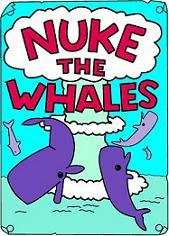



Sorry, did I miss anything?

Anon. wrote:Extrapolating this further I could imagine one might choose to die for something rather than live with the guilt of not having died for it. Is that selfishness?
Well, yes. It's a funny definition of selfishness though. It's not to seperate things into 'selfish' and 'unselfish' like "I have a big bag of sweeties. A- I eat them all myself. B- I eat some and keep some for later. C- I at some point share them with my friends. D- I throw them all away". Of course, you'd need to query how many sweeties everyone else has and whether you deserved them, how you came by the sweeties, if sweeties are good things or bad things in the first/last/middle place etc before
really getting a sensible answer.
In those cases, C & D, would strike me as the 'less selfish' ones. But my point basically stems from 'selfish isn't bad'. In view of the primary (i.e. little) school ethics of 'share= good, keep= selfish and bad' then I'd suggest, quite obviously, that the situation isn't that simple. None of the options is necessarily 'bad'.
Still, as per Anon's example of dying because you didn't want the guilt of living, well, I'd highlight the selfishness we (as a loose society) commonly attribute to suicide. It's a 'get out of everything' card. It's quite selfish. Still, I bet some folks would suggest that the unjust (escaping justice's pound of flesh!) suicide of, say, Harold Shipman, would still be half-selfless in that it's also a good thing. Obviously selfish because it got him out of a bad spot (well..., or ought that be: hell...), but it's somewhat selfish (I doubt he did it for noble reasons, but it's possible some sort of atonement along the lines of 'I give you my, you deserve it more than I!' would be the evidently unselfish part.
Now, in a book I'd been reading recently (
Bloodlines by Kathy Traviss, a Star Wars novel* and, frankly, generally awful/not-for-me in style) our character elects to do something he deludes himself into thinking is "the epitome of unselfishness"; which is: decide to kill the people you love most in sacrifice in order to get something you deem rationally more important.
Now, it sounds quite ludicrous to me, and if I'd been playing the game of that character's life (which'd surely be more fun than the novel was) I'd have opted for valiantly less ridiculous decisions, but nevermind that. The point is sortof clear. The closest we're going to get, I think, in terms of 'unselfish' is in sacrificing your overt emotional desires (attachment to one thing/person) in favour of something more 'noble' (attachement or value to something/one else). In that regard, a pacifist or conscientious(sp?) objector who joins the army to blindly (if ably) follow orders would be, in a manner, selfless. But then he's still getting some (we can be sure) solace from knowing that it's selfless...
That's sort of my point, still. In Anon's example, we tend to make most of our decisions with self interest (or satisfaction) in mind. We can forgoe our own immediate imperatives in favour of something a bit more abstract (sacrificing our own preferences in favour of someone's whom is much more pleasant to share a bed with than just one's hand, for instance...

), but then that's really a trade. It's still got your self interests at heart...sortof. A trade, even. It's not quite convincing though.
So, focus: Anon's example. Is it selfless? Totally: No. Generally, it's something I'd be content with people idly calling 'selfless', but the pedant in me would still say "It's in their own interests..."
As I've said before: It's a funny way to look at selflessness and really ends up with selfless actions being ones one didn't intend. But then being selfish, in this view, isn't a bad thing. It's a...natural thing, and it's something which can be quite good, wholesome and rewarding.
Certainly from an amateur/pigeon/pseudo-psychological-evolutionary outlook, it makes sense, to a degree. One of the most compellling ways to behave is 'selfish', in an odd general sense, but there's surely an underlying motive for it. There's a compelling argument that we don't need a god, a divinely good force, or even the Force to have the modern morals/ethics/etc we have today. If they came from somewhere, it's a vaguely intriguing idea to assume that the 'good' and 'bad' ideas we have are sortof conditional.

But in a wholesome way. It'd be the case then, I suspect (though presently have done no amount of thinking or researching on the matter in depth), that our 'healthy' ideas of good and bad fall out of the equation at the end of a lot of theorising. If selfishness is just a motivator in seeing what suits oneself, then the idea that there's complex interactions going on (i.e. 'punch this girl and steal her food just in case' or 'be nice to her, perhaps kiss her eventually...maybe more, then take her food and by then she'll be happy with that' style decisions) with which selfishness is just a wee part.
In that regard then, making a decision in general is a bit selfish. I suppose, it's a way of looking at decision making.
This does, however, require more thought.
Anon. wrote:Another thing which quite often comes up in cheesy romances is someone abandoning their own attempts on "the one they love" because they recognise that the adored object would be happier with someone else. Would that be selfishness? Yes, because that person would get more joy from someone else's happiness than they would from their own? Er, but isn't that what unselfishness is?
Well, yes. But that's the point of the
Friends argument. Joey claims that even those commonly heroic, epic and brilliantly unselfish actions aren't exactly giving
everything away and keeping
nothing for yourself. You're still getting a large degree of mental...calm(?), satisfaction(?) from them.
Still, as mentioned above, I do think it's crucially hanging on the point of what we understand to be an unselfish action. Or, rather, in the
Friends case, by noting that, you
can weigh up things (so it's
more for someone else and only selfish in a small degree). I'm not sure I agree with that, but then I'm not a psychologist, sociologist, neuroscientist or other appropriately versed person.
The trick there, I guess, would be that you'd start having folks talking about second-order selfishness. Being
really nice to people
only to get what you want..., secretly hating them all the time. But that'd be distinct from selfishness that's purely 'not good for other folks'...
I knew a friend once who was much like that. Seemed to delight in doing genuinely good things, but was (in my view) really just swirling the whole pot around. Some well placed good deeds, some casual words here and there suggesting thoughts, 'accidently' letting slip bits of what someone else said in another conversation, breaking a 'secret promise' because it's 'better for everyone to know', that sort of thing. Invididually often good and noble and 'heroic' deeds, but generally very masterfully...selfish. Orchestrating the whole thing...for their own amusement. It's difficult to explain.
The point, therefore, is that one can be very selfishly motivated (and even overtly selfish in deeds), but still in my view a decent, good and wholesome person, yet also you could be a very (seemingly) unselfish person and be quite destructive and selfish in the sense of that extra 'second-order' I mentioned above.
Essentially, I think Haunted's stance on ignoring the mental/abstract aspects of selfish/good/whatever conundrum is a fine method. But I suspect it's not entirely accurate to be ignoring it. (But then, as also mentioned, I'm no professional mind-studier, the longer term good/bad effects there could be quite intriguing, if they could be studied)
* Incidentally, some Star Wars novels have been particularly endearing. I started reading Zahn's
Outbound Flight today and am enjoying it much more. A fine example of
good tie-in fiction, whilst Traviss' work was a fine example of....
awful. I only got back into the 'game', so to speak' after some chums at home harrassed me into it. Other books I'm reading are [/i]Pride & Prejudice[/i],
A Tale of Two Cities and
Monkey: Journey to the West, I'm sure I'll get a really good book one day soon...!














 ), but then that's really a trade. It's still got your self interests at heart...sortof. A trade, even. It's not quite convincing though.
), but then that's really a trade. It's still got your self interests at heart...sortof. A trade, even. It's not quite convincing though.
